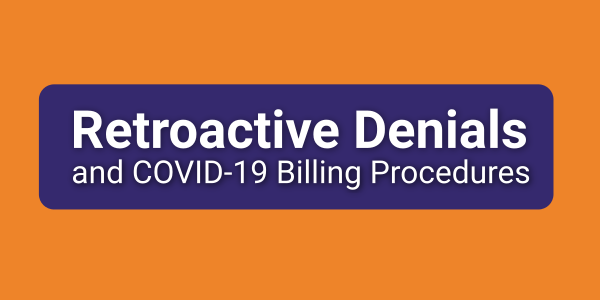
Mar 15, 2022 | MedCycle Solutions, Partner
By Ranadene Tapio, MBA, CMRS, CPCS
As healthcare delivery gets more complex, patient reimbursement decreases, and patient demand increases, practices are forced to reevaluate their revenue cycle management (RCM) process.
Some people underestimate the importance of effective revenue cycle management. RCM is the lifeblood of your practice. It determines almost all key performance indicators and practice health.
Along with the obvious indicators, here are six positive impacts that effective revenue cycle management has on a healthcare practice.
- Collections. An effective RCM process will include a strategy for collections. This should include prompt reminders, multiple payment options and other collections best practices.
- Productivity. A commonly overlooked benefit of an effective RCM strategy is increased productivity for your staff. Your team will be able to spend less time chasing collections, correcting erroneous codes and reinventing the wheel. A well laid out process will be easy to follow and more efficient.
- Team morale. Along with increased productivity, you’re likely to see a boost in team morale as a direct benefit of a defined RCM process. When employees are productive and accomplishing goals, they are happier and find more satisfaction in their work. It’s a win/win!
- Bottom line. Possibly the best benefit of optimizing your RCM is an improved bottom line. You’ll be collecting more, spending less, attracting more patients and being more productive. Whether they’re hard benefits or soft benefits, they’ll have an impact on your bottom line.
- Patient satisfaction. With a well formulated plan in place, your practice will be running more efficiently and effectively. Patients will notice the difference that comes in better efficiency, communication and processes. In many practices, these benefits are noticed by the patients in the forms of less wait time, quicker registration and overall a more organized delivery of care.
- Compliance. An effective RCM process helps ensure compliance and protection of patient data. When a process is followed, fewer errors are made, which leads to fewer compliance issues.
Is your RCM process optimized? Is it well-developed, well-defined, and well-understood by your staff? Are you reaping the benefits of a healthy revenue cycle management process?
There are many great organizations that can help you in these areas – MedCycle Solutions is one of them. If you’re wondering how partnering in these areas could work for your practice, let’s connect.
Ranadene (Randi) Tapio, MBA, CMRS, CPCS is the Founder and CEO MedCycle Solutions, which provides Revenue Cycle Management, Credentialing, Outsourced Coding, and Consulting Services to a number of healthcare providers in a variety of specialties. To find out more about MedCycle Solutions services please visit www.MedCycleSolutions.com. You can reach Randi via email at Randi@MedCycleSolutions.com or call 320-290-6448.

Mar 12, 2022 | EZClaim
There is one feature of EZClaimPay that has received universal acclaim from our clients, and that is the ability to send SMS text message-based payment reminders to patients. By reaching patients where they are—on their phones—we’ve seen that billers can increase their payment rates and get paid more quickly. This feature has increased patient satisfaction too, reducing payment friction, and allowing them to make a payment in the EZClaim portal with one tap. One client told us:
“We sent out the first SMS payment requests last week, and within several hours had generated 9 payments for a total of over $2,400 back from the patients! The provider is thrilled. After 2 days we had over 11 payments and more than $2,600! What a testament to how well this payment option is for providers and patients.”
With the average business owed $300,000 in late payments, utilizing a two-pronged payment reminder approach is critical to reducing late payments. EZClaimPay automatically generates a payment portal link which can then be sent out via email or SMS. On average, emails receive a 25% open rate, while SMS messages have an average open rate of 98%. Text messaging has proven very effective, with high open rates and engagement rates. However, email notifications are not going away. In fact, using both mediums is the best way to get paid, as each has pros and cons. With email notifications, you get deliverability to every device that your client has, whether it is their computer or the email app on their phone or tablet. With SMS text messaging, you are only getting deliverability to one device, but it is the device that is most likely to be in their pocket right now. When it comes to time sensitive requests like payment reminders, the ability to use SMS text messaging is critical.
Why choose SMS text message payment reminders for patients?
Invoices get paid faster and are more convenient for patients
Reduce payment friction by making invoice payments seamless for customers. EZClaimPay generates a direct link to include in the email or SMS communication that allows your client to make a payment instantly. Making payments easy for patients is a quick and low-cost way to increase patient satisfaction and results in greater engagement overall.
Reach patients with ease
Patients are used to providing their phone numbers to providers, and it is the one piece of contact information that is most likely to be on file. Stop getting stuck in spam and go straight to notifications.
Time savings & reduced operational costs
It gets expensive having patient statements printed and mailed out multiple times. Don’t waste any more time following up with customers manually and making repeated phone calls they may not answer. Give patients a notification right in their pocket and let them pay in one tap with EZClaimPay.
There are so many benefits to using EZClaimPay, and specifically the SMS text messaging functionality for payment reminders. EZClaimPay allows patients to pay online, increase revenue, and a simplify the payment process. For more information contact us or call directly at 877.650.0904.

Mar 8, 2022 | MedCycle Solutions, Partner
By: Winona Thomas BS HCS
According to Kaiser Health News, there has been a spike in retroactive denials for emergency department care and more patients are being caught in the middle of possibly becoming responsible for unresolved hospital bills.
Healthcare providers along with healthcare payers are finding challenges with keeping up with the evolving government guidelines for correct claim submissions of COVID-19 billing procedures. Challenges such as unnecessary claim denials, underpayment of claim payments or payment delays, and retroactive claim denials may pay tribute to increased volumes of patient billing.
In an article written in the Healthcare Financial Management Association (HFMA), Revenue Cycle leaders provide 4 tips to keep ahead of denials amid the pandemic.
- Pinpoint the most at-risk areas – Identify areas where providers are most likely to have difficulties keeping track of varying payer requirements introduced a new level of intricacy to claim processing.
- Strengthen team communications – As the workforce transitioned to a remote environment due to the pandemic, for health systems, that meant remote revenue cycle processes had not been fine-tuned across functions, presenting challenges for areas such as customer service and claim processing.
- Proactively manage relationships with payers – An organization’s ability to identify changes to payer rules around COVID-19 and telehealth claims, in real time, and keep staff informed on the variances in billing rules by payer is essential to denials prevention.
- Increase payment flexibility for patients – Health systems ramped up patient payment options — from self-service options to payment plan offerings – to ease consumers’ financial fears ex
One of the key components for healthcare providers is to be proactive with the implementation of new revenue cycle processes and procedures to facilitate improved payment and denial management strategies with healthcare payers and the consumer population.
Winona L. Thomas, BS HCS is an Account Specialist and Writer at MedCycle Solutions, which provides Revenue Cycle Management, Credentialing, Outsourced Coding, and Consulting Services to a number of healthcare providers in a variety of specialties. To find out more information about MedCycle Solutions services, please visit www.MedCycleSolutions.com.




